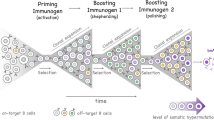Abstract
We investigate a minimalistic model of the idiotypic network of B-lymphocytes where idiotypes are represented by bitstrings encoding the nodes of a network. A node is occupied if a lymphocyte clone of the corresponding idiotype exists at the given moment, otherwise it is empty. There is a continuous influx of B-lymphocytes of randomly (by mutation) generated idiotype from the bone marrow. B-lymphocytes are stimulated to proliferate if its receptors (antibodies) are cross-linked by complementary structures. Unstimulated lymphocytes die. Thus, the links of the network connect nodes encoded by complementary bitstrings allowing for a few mismatches.
The random evolution leads to a network of highly organized architecture depending on only few parameters. The nodes can be classified into different groups with clearly distinct properties. We report on the building principles which allow to calculate analytically characteristics as the size and the number of links between the groups previously found by simulations.
Preview
Unable to display preview. Download preview PDF.
Similar content being viewed by others
References
Burnett, F.M.: The clonal selection theory of acquired immunity. Vanderbuilt Univ. Press, Nashville, TN (1959)
Jerne, N.K.: Towards a network theory of the immune system. Ann. Inst. Pasteur Immunol. 125C, 373–389 (1974)
Shoenfeld, Y.: The idiotypic network in autoimmunity: Antibodies that bind antibodies that bind antibodies. Nature Medicine 10(1), 17–18 (2004)
McGuire, K.L., Holmes, D.S.: Role of complementary proteins in autoimmunity: an old idea re-emerges with new twists. Trends in Immunology 26(7), 367–372 (2005)
Carneiro, J.: Towards a comprehensive view of the immune system. Ph.D thesis, University of Porto (1997)
Coutinho, A.: A walk with Francisco Varela from first- to second generation networks: In search of the structure, dynamics and metadynamics of an organism-centered immune system. Biol. Res. 36, 17–26 (2003)
Perelson, A.S., Weisbuch, G.: Immunology for physicists. Rev. Mod. Phys. 69, 1219–1267 (1997)
Perelson, A.S., Oster, G.F.: Theoretical studies of clonal selection: Minimal antibody repertoire size and reliability of self-non-self discrimination. J. Theor. Biol. 81, 645–670 (1979)
Strogatz, S.H.: Exploring complex networks. Nature 410, 268–276 (2001)
Dorogovtsev, S.N., Mendes, J.F.F.: Evolution of Networks: From Biological Nets to the Internet and WWW. Oxford University Press, Oxford (2003)
Barabási, A.L., Albert, R.: Statistical mechanics of complex networks. Rev. Mod. Phys. 74, 47–97 (2002)
Brede, M., Behn, U.: Patterns in randomly evolving networks: Idiotypic networks. Phys. Rev. E 67, 031920, 1–18 (2003)
Farmer, J.D., Packard, N.H., Perelson, A.S.: The immune system, adaption, and machine learning. Physica D 22, 187–204 (1986)
Coutinho, A.: Beyond clonal selection and network. Immunol. Rev. 110, 63–87 (1989)
Varela, F.J., Coutinho, A.: Second generation immune networks. Immunology Today 5, 159–166 (1991)
Stewart, J., Varela, F.J.: Morphogenesis in shape space. Elementary meta-dynamics in a model of the immune system. J. Theor. Biol. 153, 477–498 (1991)
Detours, V., Bersini, H., Stewart, J., Varela, F.J.: Development of an idiotypic network in shape space. J. Theor. Biol. 170, 401–414 (1994)
yEd - JavaTM Graph Editor, v2.3.1_02, http://www.yWorks.com
Schmidtchen, H.: Architecture of randomly evolving networks. Diploma Thesis, Leipzig University, Leipzig (2006)
Brede, M.: Random Evolution of Idiotypic Networks: Dynamics and Architecture. Ph.D Thesis, Leipzig University, Leipzig (2003)
Sulzer, B., van Hemmen, J.L., Behn, U.: Central immune system, the self and autoimmunity. Bull. of Math. Biology 56, 1009–1040 (1994)
Brede, M., Behn, U.: The architecture of idiotypic networks: percolation and scaling behaviour. Phys. Rev. E 64, 011908, 1–11 (2001)
Author information
Authors and Affiliations
Editor information
Editors and Affiliations
Rights and permissions
Copyright information
© 2006 Springer-Verlag Berlin Heidelberg
About this paper
Cite this paper
Schmidtchen, H., Behn, U. (2006). Randomly Evolving Idiotypic Networks: Analysis of Building Principles. In: Bersini, H., Carneiro, J. (eds) Artificial Immune Systems. ICARIS 2006. Lecture Notes in Computer Science, vol 4163. Springer, Berlin, Heidelberg. https://doi.org/10.1007/11823940_7
Download citation
DOI: https://doi.org/10.1007/11823940_7
Publisher Name: Springer, Berlin, Heidelberg
Print ISBN: 978-3-540-37749-8
Online ISBN: 978-3-540-37751-1
eBook Packages: Computer ScienceComputer Science (R0)




